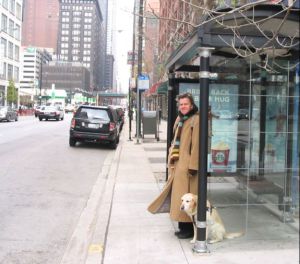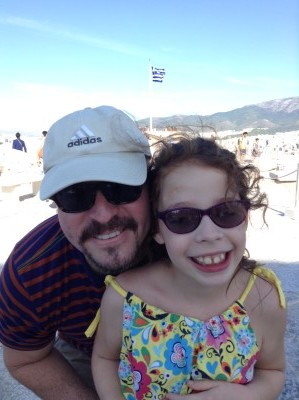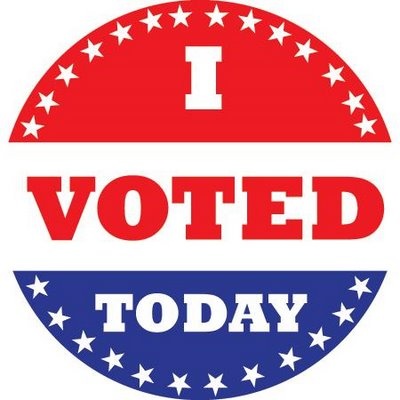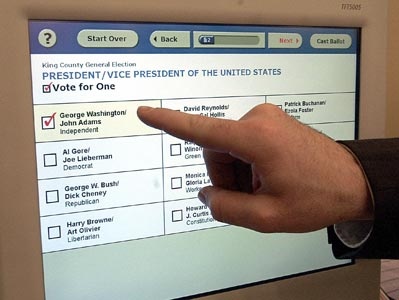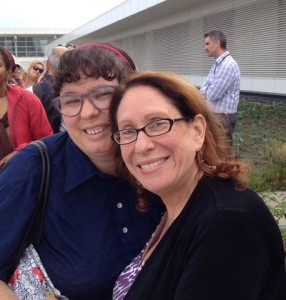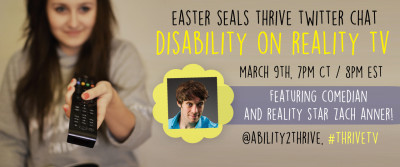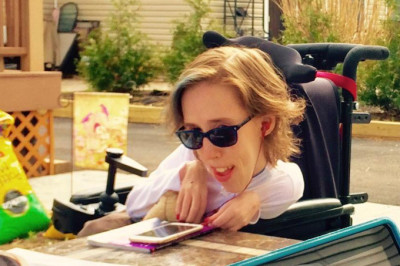How a simple ‘tap’ made for a great day
by Beth Finke
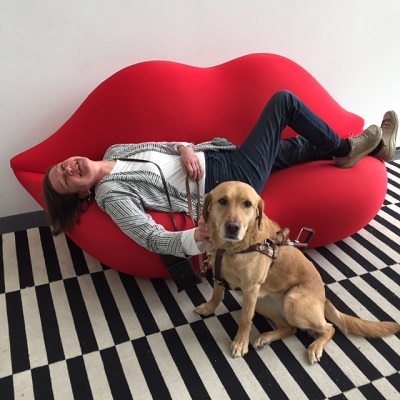
There I am lounging on a ruby red couch that’s shaped like lips – an example of the pop art described to us at the Museum of Contemporary Art Chicago). Seeing eye dog Whitney wasn’t allowed on the couch.
One good thing came from the fall I took in December: Breaking my hand convinced me to apply for a Taxi Access Program (TAP) card.
The TAP card gives taxi discounts to Chicagoans whose disabilities make it difficult to access regular public transportation. Just “tap” the card on a screen in the back seat the same way others tap their credit cards and receive a discounted ride (taxi drivers are reimbursed for the remaining cost by the Regional Transit Authority).
My pride prevented me from applying for a TAP card before. I felt perfectly capable of taking a regular Chicago Transit Authority bus with my Seeing Eye dog Whitney to the memoir-writing classes I lead in Chicago. That was until it started to snow and was difficult to get to the bus stop. And then I fell and broke my hand. I wore a cast for six weeks. I started to think, gee, maybe those cards are intended for people like me!
I called the Regional Transit Authority to apply, they sent reams of paperwork, my husband Mike can see and helped me fill the forms out, we mailed them in, the RTA called me for a phone interview, they set up a time for me to come to their office in-person, I arrived at the RTA office and answered more questions, Whitney led me to a bus stop, and an RTA staffer trailed behind to watch us step onto a bus. All this to see whether I’m “disabled enough” to qualify for a TAP card.
I don’t berate the RTA for putting me through all those hoops. I blame the scoundrels who fake or exaggerate their disabilities to use service animals, park in handicapped parking spots, and get cab discounts. In the end, I passed the audition. Or, I guess I failed: I qualified. My TAP card came in the mail last week! Perfect timing, as I needed it on my totally blind day Wednesday:
- 10:30 a.m. Used TAP card for cab ride from our apartment to Museum of Contemporary Art Chicago (MCA)
- 11:00 a.m. Attended first ever special hour-long tour at MCA for people who are blind or have visual impairments
- Noon Reviewed tour with MCA staff and shared suggestions and recommendations for the next special tour
- 1:00 p.m. Phoned cab for pick up at MCA and ride to Chicago History Museum
- 1:30:p.m. Attended first ever touch tour created by the Chicago History Museum for visitors who are blind or have low vision — it was a 90-minute highlights tour of a permanent exhibition called Chicago: Crossroads of America (can you believe both of these were on the same day?!)
- 3:30 p.m. Reviewed tour with MCA staff and shared suggestions and recommendations for the next special tour
- 4:00 p.m. A friend who met Whitney and me to join us on the Chicago History Museum tour walked with us to La Diosa to enjoy a delicious early dinner together — La Diosa owner and manager Chef Laura Martinez is, you guessed it…totally blind
- 5:30 p.m. Called cab and used TAP card for taxi ride home.
My TAP card won’t work on Uber or Lyft or other ride-sharing services, but all the registered cab companies in Chicago accept it. If it weren’t for my new TAP card I don’t think I would have signed up for both of those tours in one day — I’d be too anxious about bus routes, getting to new bus stops, knowing what commands to give Whitney when we disembark — excuse the dog pun — at a new and unfamiliar corner. Thanks to TAP, last Wednesday I was able to help two museums fine-tune future touch tours, and I did it all by going totally blind.







